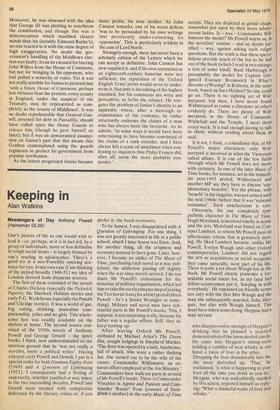Keeping in
Alan Watkins
Messengers of Day Anthony Powell (Heineman E6.00) One's picture of life as one would wish to lead it — or, perhaps, as it is in fact led, by a group of individuals, more or less definable in rough social terms — is largely formed by one's reading in adolescence. There's a good try at a neo-Powellite opening sentence for you. In my own case (I am thinking of the period broadly 1946-51) my idea of London derived from disparate sources.
The first of these consisted of the novels of Charles Dickens (specially the Pickwick Papers), the Sherlock Holmes stories and early P.G. Wodehouse (specially the Psmith ' and Ukridge stories). It was a world of gas, fog, eating, drinking, masculine companionship, jokes and no girls. This wholesome fare was readily available on the shelves at home. The second source consisted of the 1930s novels of Anthony Powell and George Orwell — the latter books, I think, now underestimated on the spurious ground that he 'was not really a novelist, more a political writer'. Having enjoyed early Powell and Orwell, I put in a special order for both Nineteen Eighty-Four (1949) and A Question of Upbringing (1951). I consequently had a feeling of superiority, whether justified or not, when, in the two succeeding decades, Powell and Orwell were treated with conspicious deference by the literary critics or, if you prefer it, the book-reviewers.
To be honest, I was disappointed with A Question of Upbringing. For one thing, I was not greatly interested in life at a public school, which I later learnt was Eton. And, for another thing, all the crispness and economy seemed to have gone. Later, however, I became an addict of The Music of Time, purchasing each novel as it was published; the addiction passing off slightly when the war-time novels arrived. I do not share Mr Powell's enthusiasm for the minutiae of military organisation, which led him to take the surely extreme stepofjoining the Territorial Army for a brief period (this is Powell — he's a Senior Wrangler or something). Military and naval men have substantial parts in Mr Powell's books. This, I suppose, is not surprising really, because his father was a regular officer. Still, they do keep turning up.
After leaving Oxford Mr Powell, enthused by Michael Arlen's The Green Hat, sought lodgings in Shepherd Market. 'The door was opened by a lady, handsome, full of attack, who wore a rather dashing hat. She turned out to be the wife of the owner, Commander Williamson, an exnaval officer employed at the Air Ministry.' Commanders have walk-on parts in several of Mr Powell's books. There is Commander Venables in Agents and Patients and Commander 'Buster' Foxe (consort of Stringham's mother) in the early Music of Time
novels. They are depicted as genial chaps, somewhat put upon by their more adven
turous ladies. Is — was — Commander Wil liamson the model? Mr Powell warns us, in the novelists' routine — and no doubt jus
tified — way, against Asking such vulgar
questions. But the truth is that these speculations provide much of the fun to be had out of the book (which I read in two sittings, a test of some kind). Basil Harbrough is presumably the model for Captain (res igned) Eustace Bromwich in What's Become of Waring? Is Roberta, in the same book, based on Inez Holden? So one could go on. There is no sighting yet of Widmerpool: but then, I have never found Widmerpool as comic a character as others evidently do. There are plenty of Widmerpools in the House of Commons, Whitehall and the Temple. I meet them every week. It is bad enough having to talk to them, without reading about them as well.
It is not, I think, a coincidence that, of Mr Powell's major characters, only Widmerpool is involved in what.the Victorians called affairs. It is one of the few fields through which Mr Powell does not move with certainty. In one of the later Music of Time books, for instance, set in the immediate post-1945 period, Widmerpool and another MP say they have to discuss 'supplementary benefits'. Yet the phrase, with 'benefit' in the singular, was not coined until the mid-1960s: before that it was 'national assistance'. Such anachronism is rare.
Obversely, the one completely sytIl• pathetic character in The Music of Time, Hugh Moreland, is involved wholly in music and the arts. Moreland was based on Constant Lambert, to whom Mr Powell pays an affectionate tribute that is genuinely moving. He liked Lambert because, unlike Mr Powell, Evelyn Waugh and other Oxford contemporaries, Lambert did not regard the arts as acquisitions or social weapons; they came naturally, were part of his life. There is quite a lot about Waugh too in the book. Mr Powell clearly possesses a formidable social talent for, as my (and his) fellow-countrymen put it, 'keeping in with everybody'. He remained on friendly terms not only with the first Mrs Waugh and the man she subsequently married, John Heygate, but also with Waugh himself. This must have'taken some doing. Heygate had a man servant
who disapproved so strongly of Heygate's drinking that he planned a practical demonstration of the harm alcohol can do. He came into Heygate's sitting-room holding a tumbler of neat whisky in one hand,-a piece of liver in the other.
Dropping the liver dramatically into the the meat shrivelled up. 'That,' he exclaimed, 'is what is happening to your; liver all the time you drink as you do. Heygate, who was undoubtedly startled. by this action, reported himself as replying: 'What a shameful waste of liver and whisky.'


































 Previous page
Previous page